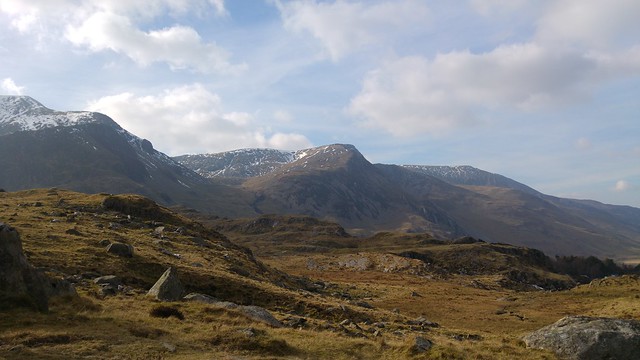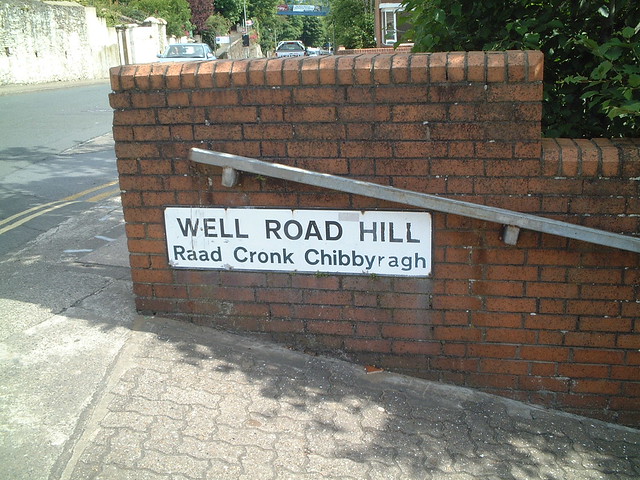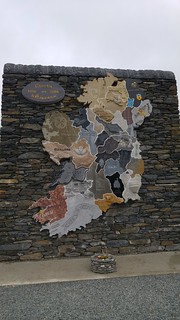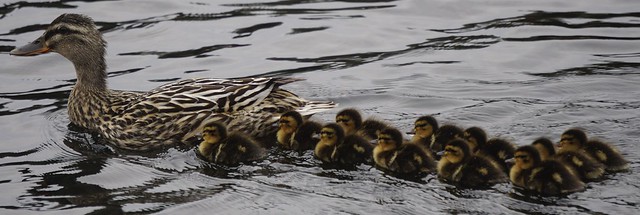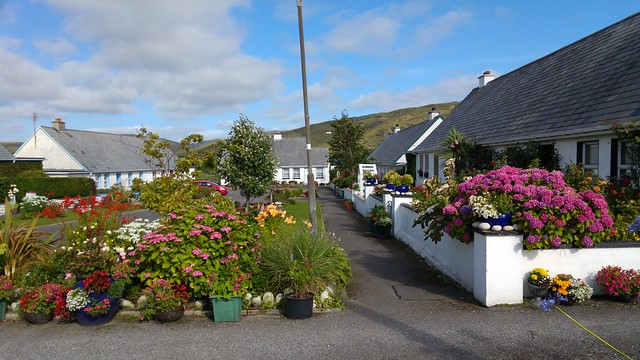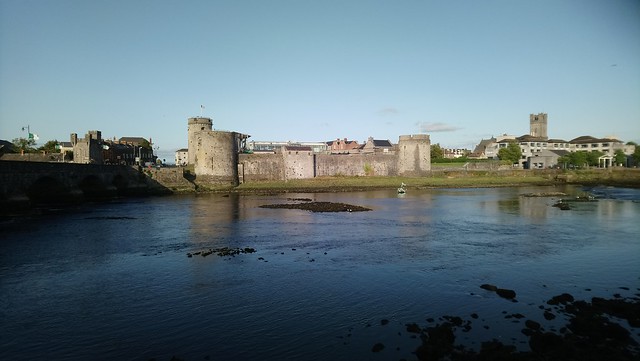Words for hill and related words in Celtic languages.
| Proto-Celtic | *ardwos = high |
|---|---|
| Gaulish | Arduenna = place name |
| Old Irish (Goídelc) | ard [ar͈d] = high, height |
| Middle Irish (Gaoidhealg) | ard, árd = high above ground, elevated, lofty, tall, noble, great, proud, arduous, high place, height ardach = hilly ardae, airde = height, high place, nobility, loudness ardaid = to rise ardaigid = to raise, magnify, exalt ardán = pride, arrogance ardri = high king |
| Irish (Gaeilge) | ard [ɑːɾˠd̪ˠ/æːɾˠd̪ˠ] = height, hillock, top, high part, elevation, head, rise, ascent ardaigh = to raise, elevate, ascend, carry ardaitheoir = lift, elevator na farraigí arda = the high seas sála arda = high heels Ard-Aifreann = High Mass Ard-Aighne = Attorney-General ardaingeal = archangel |
| Scottish Gaelic (Gàidhlig) | àrd [aːr̪ˠd] = high, lofy, tall, great, loud, chief, eminent, superior, supreme àrd-bheinn = pinnacle |
| Manx (Gaelg) | ard [ø(r)d] = high, towering, tall, big, loud, height, high place, fell, incline |
| Proto-Brythonic | *arð = high |
| Middle Welsh (Kymraec) | ard, art = hill |
| Welsh (Cymraeg) | ardd [arð/aːrð] = hill, highland, top, high, upland |
| Middle Cornish (Cernewec) | ard = high, lofty |
| Cornish (Kernewek) | ardh = height, high place |
| Breton (Brezhoneg) | arz = high, elevated, lofty |
Etymology: from the Proto-Indo-European *h₃r̥dʰwós, from *h₃erdʰ- (to increase, grow, upright, high) [source], which is also the root of the Latin word arbor (tree) and words for tree in Romance languages [source].
| Proto-Celtic | *knokkos = protuberance, hill |
|---|---|
| Old Irish (Goídelc) | cnocc [knok] = hill, lump, swelling cnoccach [ˈknokax] = hilly, lumpy cnocán [ˈknokaːn] = little lump, mound, hill |
| Middle Irish (Gaoidhealg) | cnocc = lump, protruberance, hill, mound cnoccach, cnocach = lumpy, hilly cnoccán, cnocán = little lump, mound, hill |
| Irish (Gaeilge) | cnoc [kn̪ˠɔk / kn̪ˠʊk/ kɾˠʊk] = hill, mount cnocach = hilly cnocadóir = hillman, hillclimber cnocadóireacht = hill-climbing cnocán = hillock, heap cnocánach = hilly, uneven |
| Scottish Gaelic (Gàidhlig) | cnoc [krɔ̃xg] = hill, small hill, hillock, knoll, chilblain cnocach [krɔ̃xgəx] = hilly, rugged, abrupt cnocaireachd [krɔ̃xgɛrʲəxg] = rough hill walking, pacing cnocan [krɔ̃xgan] = hillock, ball of fibre |
| Manx (Gaelg) | cronk = mount, tor, hill, crongan = mound, small hill, tuffet, tumulus, hillock cronkan = knoll, small hill, hillock |
| Proto-Brythonic | *knox = hill, mound |
| Middle Welsh (Kymraec) | cnwch = swelling, protuberance, thickness, hump |
| Welsh (Cymraeg) | cnwc = hillock, knoll; swelling, tumour, lump, knob, hump cnocell = hillock, knoll |
| Old Breton | cnoch = hill |
| Middle Breton | qnech, knech, crech, cre(a)c’h = high, height, mountain, hill krec’hennek full of hills krec’hiek = steep, sloping, incluned |
| Breton (Brezhoneg) | krec’h = height, eminence, mound |
Etymology: from the Proto-Indo-European *kneg- (back of the head, nape, neck). The English word neck, and related words in other Germanic languages, come from the same root [source].
| Proto-Celtic | *brusnyos = hill |
|---|---|
| Old Irish (Goídelc) | bruinne = breast(s), bosom, chest; womb |
| Middle Irish (Gaoidhealg) | bruinne, bruinde = breast, bosom, chest |
| Irish (Gaeilge) | broinne = breast, bosom; brink, verge |
| Scottish Gaelic (Gàidhlig) | broinne [brɤin̪ʲ] = belly, stomach; womb; bulge |
| Manx (Gaelg) | brein = womb |
| Proto-Brythonic | *bronnā = breast |
| Middle Welsh (Kymraec) | bronn, bron = breast, bosom |
| Welsh (Cymraeg) | bron [brɔn] = breast, bosom, thorax, hill-side, slope, breast (of hill) bronallt, broniallt = gentle slope of hill, rising ground, wooded slope bryn = hill, mount, rise, bank; heap, mound; prominence, highness |
| Middle Cornish (Cernewec) | bron = a round protuberance, breast, pap, slope of a hill |
| Cornish (Kernewek) | bronn / brodn [brɔn: / brɔdn] = breast, hill |
| Middle Breton (Brezonec) | bron, bronn = breast, bossom, udder bronnañ, bronnat, bronniñ = to breast feed |
| Breton (Brezhoneg) | bronn [ˈbrɔ̃n] = breast |
Etymology: from Proto-Celtic *brusū (belly, abdomen, breast), possibly from the Proto-Indo-European *bʰrews- (belly, to swell) [source].
Words from the same Proto-Celtic root, via the Proto-West-Germanic *brunnjā (chainmail shirt), include: brynja (coat of mail) in Icelandic, Swedish and Faroese, brynje (mail, armour) in Danish, brynje (coat of armour, protective clothing for motorcyclists) in Norwegian, and броня [brɔˈnʲa] (armour, armoured vehicle, shell) in Ukrainian [source].
The English words breast, brisket and bruise come from the same PIE root, as do borst (chest, thorax, breast) in Dutch, Brust (chest, breast, bosom) in German, and bröst (breast, chest, thorax) in Swedish [source].
| Proto-Celtic | *brixs / *brig- = hill |
|---|---|
| Gaulish | *brignā, -brigā = hill |
| Old Irish (Goídelc) | brí [bʲrʲiː] = hill |
| Middle Irish (Gaoidhealg) | brí, bri = hill |
| Irish (Gaeilge) | brí [bʲɾʲiː] = brae, hill |
| Scottish Gaelic (Gàidhlig) | bre = hill, headland |
| Proto-Brythonic | *breɣ [ˈbrɛːɣ] = hill |
| Welsh (Cymraeg) | bre [bre] = hill, hillock, mountain, hill-country, upland, peak |
| Middle Cornish (Cernewec) | bre = mountain, hill |
| Cornish (Kernewek) | bre [brɛ: / bre:] = hill – appears as Bray or Brae in placenames |
| Middle Breton (Brezonec) | bre = hill |
| Breton (Brezhoneg) | bre [breː] = hill, mountain |
Etymology: from the Proto-Indo-European *bʰerǵʰ- (high) [source].
The Spanish word breña (scrub, brush, rough ground), the Portuguese word brenha (scrub, complication, confusion) come from the Gaulish *brignā, via the Vulgar Latin *brigna (rocky terrain) [source].
From the same PIE root we get the English words burrow and borough, and words in placenames such as burg, burgh and bury, and also the German Burg (castle), the Danish borg (castle, stronghold), and related words in other Germanic languages.
| Proto-Celtic | *krowko- = heap |
|---|---|
| Old Irish (Goídelc) | crúach = stack, mountain, hill |
| Middle Irish (Gaoidhealg) | crúach,cruach = stack of corn, rick, heap, conical pile crúachad = act of stacking, piling up crúachán = small rick, hill crúachda = swollen, piled up |
| Irish (Gaeilge) | cruach [kɾˠuəx] = stack, rick, pile, (mountain) stack cruachach = full of stacks cruachadóir = stack-builder cruachadóireacht = (act of) building stacks cruachán = (small) stack; person of stunned growth cruachóg = heap |
| Scottish Gaelic (Gàidhlig) | cruach [kruəx] = pile, stack; round hill; clamp (stack) cho seasgair ri luchag ann an cruach = as snug as a bug in a rug (“as snug as a mouse in a haystack”) cruach-fheòir = haystack cruach-mhòna, cruach mònach = peat-stack cruach-sheangan = anthill |
| Manx (Gaelg) | creagh = stack, furrow creagh fendeilagh = barricade creagh hraagh = haystack |
| Middle Welsh (Kymraec) | krug, gruc, grvg = hillock |
| Welsh (Cymraeg) | crug = hillock, knoll, cairn, tumulus, heap, mass, stack, group, company, multitude; pustule, abscess, boil, carbuncle |
| Old Cornish | cruc = hillock |
| Middle Cornish (Cernewec) | cruc, cruk, crŷc = hillock, mound, barrow |
| Cornish (Kernewek) | krug = mound, tumulus |
| Old Breton | cruc = hillock |
| Middle Breton (Brezonec) | krug = pile, heap krugell = pile, heap, hillock, mound, tumulus |
| Breton (Brezhoneg) | krug = mound krugell = hillock, tumulus |
Etymology: possibly from the Proto-Indo-European *krā(u)- (to heap up) [source].
| Proto-Celtic | *tumbo- = excrescence hill |
|---|---|
| Old Irish (Goídelc) | tom = bush, tuft, hillock, knoll |
| Middle Irish (Gaoidhealg) | tom = bush, tuft, hillock, knoll |
| Irish (Gaeilge) | tom [t̪ˠɑumˠ/t̪ˠʌmˠ] = bush, shrub tomach = bushy, tufted tomachán = small tuft |
| Scottish Gaelic (Gàidhlig) | tom [tɔum] = hillock, knoll, mound, clump, heap, tuft toman [toman] = small hillock tomag [tomag] = small hillock/knoll/mound, small clump, small heap |
| Manx (Gaelg) | tom = tussock |
| Middle Welsh (Kymraec) | tom, tomm = dung(hill), manure, compost, dirt, muck |
| Welsh (Cymraeg) | tom = dung(hill), manure, compost, dirt, muck, mud, mound, heap |
Etymology: possibly from the Proto-Indo-European *tewh₂- (to swell), and cognate with the English word tumulus.
Words marked with a * are reconstructions.
Sources: Wiktionary, Am Faclair Beag, Online Manx Dictionary, Teanglann.ie, eDIL – Electronic Dictionary of the Irish Language, In Dúil Bélrai English – Old Irish glossary, Geiriadur Prifysgol Cymru, Gerlyver Kernewek, Dictionaire Favereau, TermOfis, English – ProtoCeltic WordList (PDF), Etymological Dictionary Of Proto Celtic
